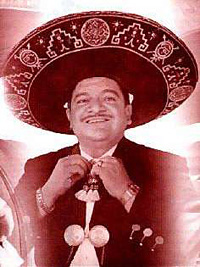 |
 |
 |
 Entertainment | January 2006 Entertainment | January 2006  
New Discs Celebrate Mexican Songwriter
 Ramiro Burr - San Antonio Express-News Ramiro Burr - San Antonio Express-News


| | The senior Jiménez died when he was 47 on Nov. 23, 1973, in Mexico City of cirrhosis of the liver.
|
The rancheras and boleros of José Alfredo Jiménez are half a century old. Yet they remain popular because they are timeless stories that hit home with new generations, says José Alfredo Jiménez Jr.

"I really feel that the songs never get outdated because of the simplicity and directness of the lyrics," Jiménez said in a recent interview from his Mexico City office. "The sheer beauty of the music makes his songs a wonderful body of work." The senior Jiménez died when he was 47 on Nov. 23, 1973, in Mexico City of cirrhosis of the liver.

His son believes his father's music will always remain fresh because the songs capture unforgettable moments and emotionally intense events. "His songs always take us somewhere, always bring back a memory," Jiménez said.

Thanks to last year's merger of Sony and BMG, the complete catalog of José Alfredo Jiménez's greatest works are now on one label. A new trilogy of hit collections was kicked off in November with the release of the "Historia de el Rey" CD/DVD package.

The CD contains 20 hits, including "Ella," "Un Mundo Raro" and "La Mano de Dios." The DVD holds 15 videos, mostly rare and never-before-seen footage of Jiménez singing.

Jiménez Jr. said the original plan was to release the second set last week, which would have been his father's 80th birthday. That as-yet-untitled CD will now be released in the spring, with the third set scheduled for the end of the year.

Three CDs for an artist who died 33 years ago may seem like a lot.

But like Frank Sinatra or Hank Williams, Jiménez has become a bedrock influence in his genre. In the world of rancheras, and especially in mariachi instruction, some estimate that Jiménez songs make up half of the basic repertoire.

Jiménez was a gifted and prolific songwriter. His greatest strength was his absorbing lyrics. He had the ability to describe in vivid and emotion-laden imagery the deep longing of love from afar, the bitter pain of class conflicts, and the reflections and self-doubt that come with darkness.

Fear, depression, solitude and sadness were his specialties.

His best songs drip with those sentiments. It is precisely that raw emotion -- that potent mix of anger and pain, fear and desperation -- that fuels the musical magic that transports fans to that special time and place.

Yet for all the sadness in his songs, Jiménez almost always injected a little hope or redemption. It is either nobleness or unselfishness. His ultimate message seemed to be that even if you lose in love, as long as you're honest and sincere, you always walk away a better man.

He lived in the time of Mexico's greatest ranchera heroes -- Pedro Infante, Jorge Negrete and Javier Solis. They all, among dozens of others, recorded his classics.

"Yo," his first hit, was released in 1950, the middle of Mexico's golden age of cinema. Like Roy Rogers and Gene Autry in America, Infante and Negrete were the hugely popular singing cowboys of their genre. And like Elvis Presley's movies, the films of Infante and Negrete are played almost every week on the Spanish-language TV networks.

| 
 | |
 |



